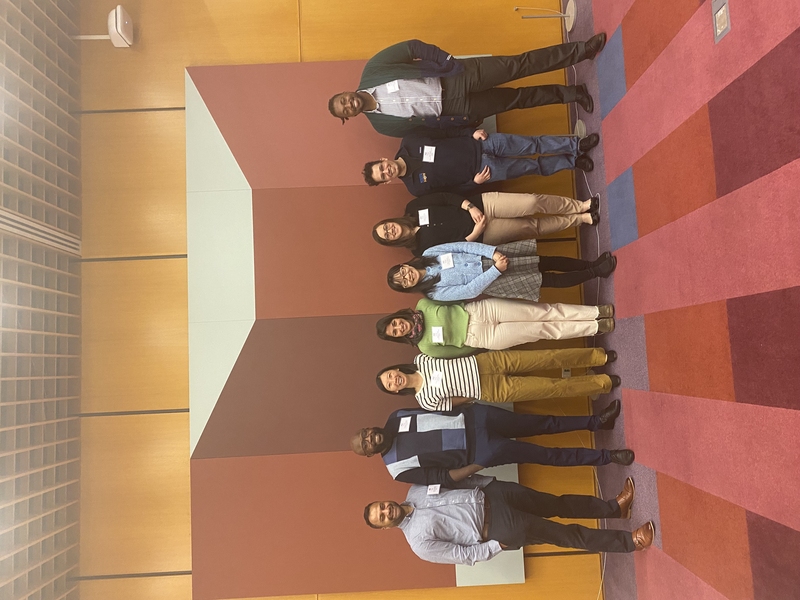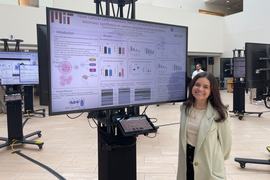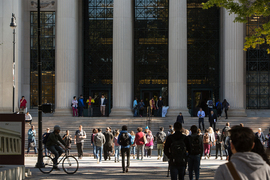The MIT biology community recently welcomed eight postdocs — Catalyst Fellows — to campus as part of the inaugural Catalyst Symposium.
Catalysts speed up reactions, and the symposium aims to accelerate progress in inclusive diversity — not just at MIT, but at top research institutions across the country, according to Professor Amy Keating, head of the Department of Biology.
“To make new discoveries and expand our understanding of life, we seek colleagues and trainees who are curious, persistent, creative, ingenious, insightful, determined, collaborative, generous, and ambitious,” Keating says. “To find these exceptional people, we have to look broadly. We have to look further than we have in the past.”
The symposium is part of an effort to expose outstanding candidates from backgrounds traditionally underrepresented in academic research to the biology department. The three-day symposium included research talks by the Catalyst Fellows, one-on-one meetings with faculty members, panel discussions on the faculty search process and the experiences of junior faculty in the department, and social events. Each Catalyst Fellow was paired with a faculty mentor.
The research talks ranged from molecular to behavioral: Krishna Mudumbi from Yale School of Medicine presented “Probing the kinetics of EGFR signaling: Why timing is important;” Coral Yishan Zhou from the University of California at Berkeley presented “Mechanisms of mitotic chromosome scaling in Xenopus;” Andre Toussaint from Columbia University presented “Neurobiology of addiction and tactile sensation;” Sofia Quinodoz from Princeton University presented “Probing nuclear organization and functions of condensates at genome-wide scale;” Junior West from Johns Hopkins School of Medicine presented “Claudin 7 restricts cancer invasion and metastasis by suppressing smooth muscle actin networks;” Shan Meltzer from Harvard Medical School presented “Molecular and Cellular Mechanisms of Touch Circuit Formation;” José Reyes from Memorial Sloan Kettering Cancer Center presented “Catching p53 in the act of tumor suppression;” and Begüm Aydin from The Rockefeller University presented “Cellular Plasticity in the Enteric Nervous System.”
Iain Cheeseman, associate department head, Herman and Margaret Sokol Professor of Biology, and core member of the Whitehead Institute for Biomedical Research, says what stood out about the event was the “fantastic celebration of amazing science.”
“I loved the presentations as well as the beautiful range of different science approaches, research questions, and ideas,” he says. “These talks focused on research areas that are not currently represented in our department, so it was great to have this exposure to these new ways of thinking and to hear from these future leaders.”
Cheeseman was also a faculty mentor for Catalyst Fellow Yishan Zhou. Each Catalyst Fellow was paired with a faculty member based on shared scientific interests and matched with those who could provide support and feedback on the fellow’s academic journeys.
Fellows were selected based on nominations from current faculty and their scientific match within the department. They began their time at MIT connecting with their faculty mentors over dinner and then gave presentations about their research the following day. Lively Q&A sessions followed each talk, which formed the basis for further conversations and potential collaborations. The department also organized panels of junior and senior faculty. The fellows heard from junior faculty who recently experienced the job search process, and from senior faculty who were involved in deciding which candidates would be invited for interviews. The aim of both panels was to provide the fellows insights that would help them succeed in their own job searches.
"The Catalyst Symposium has been a great opportunity to bring incredibly talented postdocs from across the country to share their research with our community. Our long-term goal is to promote and support scientists from underrepresented groups in their transition to faculty positions — many of the connections and collaborations that emerge from these three days will hopefully help us realize this goal,” says associate professor of biology and core member of the Whitehead Institute Sebastian Lourido. Lourido was on the organizing committee for the event.
The event also provided an opportunity for current graduate students to interact with the Catalyst Fellows; some were curious about what factors went into the fellows’ selection of a postdoctoral position.
West says that during the course of a PhD, graduate students develop three things: a scientific question or questions; a specific system to address those questions; and specific methodology.
“The advice that I was given was that when you transition from a PhD to a postdoc, you should consider keeping two of those things and changing one,” West says. “It’s very important to start off with strong footing, but changing one thing also gives you the opportunity to grow as a scientist and extend your skill set.”
In his postdoc, West has been studying tumor metastasis and is hoping to dissect the signaling network of a gene whose loss is correlated with aggressive forms of breast cancer. West says that it's important not to get so caught up in the endgame — the far-off paper or grant proposal — that one stops appreciating the triumph of everyday discoveries.
Quinodoz noted the importance of networking during graduate school, including at scientific conferences. Attending a conference helped her secure her own postdoc position: her current principal investigator heard her give a talk at a conference and invited her for an interview.
The 2022 Catalyst Symposium was planned and coordinated by diversity, equity, and inclusion (DEI) officer Hallie Dowling-Huppert; the DEI Faculty Committee, including organizing committee members Lourido, Jacqueline Lees, and Michael Laub; headquarters staff in the Department of Biology; Koch Institute for Integrative Cancer Research Director Matthew Vander Heiden; and Keating.
In future years, Dowling-Huppert says they will try fostering more of a cohort environment among the fellows, and also give the fellows more time to interact with current postdocs at MIT and others in the department, because building those relationships early in their careers will support them in the short and long terms.
Yadira Soto-Feliciano, an assistant professor of biology and intramural faculty at the Koch Institute who was paired with Reyes, says that building in some time for the fellows to explore MIT and the greater Boston area would be a welcome addition next year since some of the fellows were visiting the city for the first time. She says she’s planning to stay in contact with Reyes in the future.
“I think the Catalyst Symposium was a fantastic platform for these postdoctoral scholars to experience MIT in a more intimate fashion,” she says. “I’m certain that this experience will be beneficial in their short- and long-term success, and I would not be surprised if collaborations arose from these interactions.”









